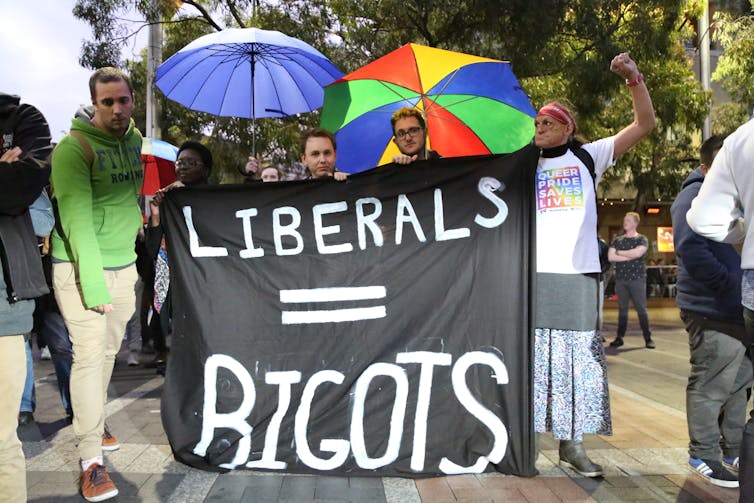Australian Human Rights Commission president Gillian Triggs recently claimed that the impact of the change of prime minister – from Tony Abbott to Malcolm Turnbull – will be “profound”. Polls show Turnbull is vastly popular. And, according to political commentator Barrie Cassidy:
Australian politics has entered a new and positive era.
But how can we determine whether the change in leadership has led to changes of substance or just style?
One way of evaluating whether there is a real difference between the two prime ministers is to measure their approaches to human rights. The international community’s recent review of Australia’s human rights record – as part of the Universal Periodic Review (UPR) – makes this particularly timely.
Turnbull’s ability to address the human rights of asylum seekers and Indigenous Australians and to move forward with same-sex marriage legislation will indicate the substance, or emptiness, of his reform agenda.
Time to stop ‘stopping the boats’
At the UPR, more than 60 nations urged Australia to end its policies of boat turn-backs, mandatory detention and offshore processing. Sarah Joseph observed that Australia’s delegation tried justifying policies in line with past government rhetoric: “stop drownings at sea”, “combat people smuggling” and “prioritise UNHCR refugees”.
The international community did not buy these “excuses”.
Turnbull has an opportunity to show Australians – and the world – that change is here. The Senate has passed a bill with amendments that require that children locked in onshore detention be released into the community.
If the House of Representatives fails to pass the amended bill, it will indicate a continued disrespect for international human rights law. More importantly, it will continue the dehumanisation of asylum seekers and refugees in detention.
Reforming Abbott’s Indigenous failure
Abbott pledged that he would be prime minister for Indigenous affairs. In his brief time in the top job, he made many decisions that were a far cry from respecting the rights of Indigenous peoples. These included:
endorsing the closure of remote Indigenous communities, because “it is not the job of the taxpayer to subsidise lifestyle choices”;
-
proposing deep cuts to the funding of Indigenous services, including Aboriginal Legal Aid; and
- resisting Indigenous leaders’ callsfor Indigenous-led conventions or consultations, so that Indigenous people can form a consensus on a model for constitutional recognition.
Abbott created the Indigenous Advisory Council (IAC), headed by Warren Mundine, to advise on Indigenous policies. However, many Indigenous Australians were, and are, critical of the council as it is not a representative body.
The IAC has also effectively sidelined the National Congress of Australia’s First Peoples – an elected body – and been the catalyst for significant funding cuts to that body.
Turnbull has met with the IAC and is calling for greater focus on the plight of urban-based Indigenous peoples. He is also urging greater innovation in the development of policies to break welfare dependence.
A focus on urban problems is welcome, given that as many Aborigines live in Sydney as in the Northern Territory. However, this cannot be at the expense of addressing major issues in Indigenous communities, such as spiralling incarceration rates, constitutional recognition and meeting the other targets of the Closing the Gap initiative.
To be a true reformer, Turnbull must take the necessary steps towards recognition and reconciliation.
Turnbull’s same-sex marriage challenge
Abbott floated the idea of holding a plebiscite on whether the Marriage Act should be amended to allow same-sex couples to marry. Turnbull has continued this policy, notwithstanding that a plebiscite is not legally necessary and would be inconsistent with children’s rights.
Proceeding with a plebiscite would be contrary to the Senate Legal and Constitutional Affairs References Committee’s recommendations. That body found that a plebiscite should not be held as the issue of marriage should not be decided through a “popular vote”; it should be decided solely by parliament.
Denying his party a conscience vote shows an unwillingness to support the right of same-sex couples to have their unions recognised in the same way as heterosexual couples. Despite progress being Turnbull’s mantra, Australia is still out of step with more than 20 countries around the world that have legalised marriage for same-sex couples.

The leader for human rights?
Turnbull has been in the top job for only three months, but the early signs aren’t reassuring. The language and culture are changing, but policies infringing on human rights remain the same.
With an election due next year, Turnbull knows he needs to ensure cohesion within his party. To minimise the risk of upsetting his Coalition members and supporters, it is unlikely Turnbull will deviate very far from Abbott’s human-rights-violating policies.
By the looks of it, Australia will continue to be “the lucky, rich, cruel country”.

